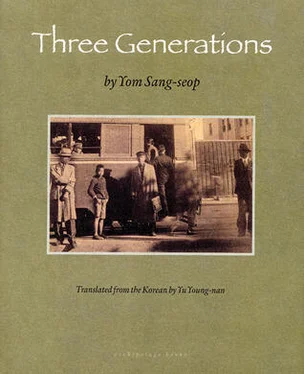According to Deok-gi’s wife, a group of conspirators huddled in the main room or in the outer quarters day and night, whispering among themselves. In her opinion, they were up to something, and trouble was brewing.
This sinister air wasn’t confined to the main room alone. It seemed to emanate from wherever several men and women passed by, in the outer quarters and in the backyard. Maybe it was a whiff of copper coins, mixed with the scent of desire — an odor turning sour and fetid. What did they intend to do with the money?
The storm that seemed to be rising was the kind that blew through any house when the master who holds the keys is taking his last breaths. In this house it might be rising from behind the scenes, like a tendril of smoke from a fire started in dry weeds. Better keep his wits about him, Deok-gi thought.
The Suwon woman’s behavior grew especially odd. Deok-gi watched her closely; she sat next to the old man all day, and she spoke to no one in Deok-gi’s family. If Deok-gi’s mother was the only one she didn’t talk to, it wouldn’t have seemed strange. In the past, she had been nice to Deok-gi, if only superficially, but now she was deaf to his questions. Only when he repeated his questions a few times did she reluctantly answer him. Even more unpleasant was the fact that she made it abundantly clear that she didn’t like Deok-gi coming to the main room. When no one was around during the daytime or evening, Deok-gi would step briefly into the main room thinking his grandfather might like company or with something to tell his grandfather. On such occasions, the Suwon woman would wince. If she couldn’t stand the sight of Deok-gi, she could have left the room, but she remained, cupping her chin with her hands. When she noticed that Deok-gi entered the room while she was outside, she dashed in from the veranda or the yard. His grandfather lay helpless, slowly blinking his frightfully sunken eyes. Deok-gi grew miserable, but he didn’t dare show it or speak to the Suwon woman. Wasn’t he the pillar of the household now? He tried to placate everyone, for they all seemed poised to lose their temper at the slightest provocation.
Deok-gi couldn’t understand why those in the outer quarters frequently flocked into the main room. He didn’t mind Secretary Ji — who was almost a member of the family and who prepared medicine for the old man with his own hands — but Clerk Choe and Chang-hun, on the other hand, were quite bothersome. At times, uncles — both older and younger brothers in the clan — gathered in the name of comforting the old man. They talked boisterously among themselves as if they were visiting a festive house, and the women in the inner quarters bustled around cooking lunch and keeping busy. Deok-gi’s head ached so much from the racket they made as they swept into the sickroom in droves, as if they were conducting a clan conference, that his hair might have fallen out. He might not have minded so much if they had stayed in the outer quarters, but despite his irritation, he couldn’t bring himself to object because his grandfather seemed to enjoy such lively visits.
These visitors spoke either in booming voices or whispered among themselves, as if they were helping out a great deal, though it was impossible to fathom what they really had in mind. No one took charge of the situation or gave intelligent instructions on the use of medicine. At such moments, Deok-gi wished that his father would exercise some authority and establish a somber tone in the house, but nothing could be done about it, and Deok-gi was too young to exercise any authority himself. On the rare occasions he tried to restore some order, visitors seemed to wonder what business a student had in such matters and would take control of the situation themselves.
“Uncle, did you bring the receipt?” Deok-gi pressured Chang-hun about the money transfer upon entering the main room, where Chang-hun was visiting after dinner. Deok-githought it odd that none of the three telegrams had reached him and wondered if the money had been embezzled somewhere along the way.
“Yes. I was waiting for my son Mun-gi to see whether he had made a mistake when he sent it, but he hasn’t come home yet.” Chang-hun took out his wallet slowly, eyes glazed over, and produced a neatly folded piece of orange-colored paper with letters printed on it.
Deok-gi unfolded it and laughed out loud.
“What’s the matter?”
“This is the money order itself. You need to send it so the recipient can claim the money.”
“Do you mean that he sent the receipt instead?”
“Possibly. But you sent a telegraphic transfer, didn’t you? This is a postal money order.”
“Postal money order? What’s a postal money order?”
“A postal money order is what you enclose in a letter.”
“Really?” Chang-hun’s eyes widened as if he’d never heard of such a thing. “What a stupid boy! How could he be so backward?”
“Give. give me.” The grandfather, who had been listening to the conversation, stretched out his hand and scolded Chang-hun. “Why, eguegu, why did you, eguegu, make the fool do it? Forget that fool, eguegu, but. you yourself still don’t know what’s what.”
“Grandfather, you don’t need to worry about the money because it’s here. Please go to sleep. You’re short of breath.” Deok-gi found it torturous to listen to his grandfather’s groans.
“I gave my son the money and the envelope from one of your letters,” Chang-hun explained. “I told him to wire the money to the address on that envelope. It’s clear he thought all money transfers were the same. He must have detached the receipt and put it in an envelope.” Chang-hun laughed.
The old man would have given him a hard time if he hadn’t been so sick. Without another word, he tossed the money order to Deok-gi and closed his eyes.
Seeing how debilitated his grandfather was, Deok-gi didn’t have the heart to talk about such trifling matters. He silently put the money order in his pocket, signaled with his eyes for Chang-hun to leave the room, and then left quietly himself. At ten o’clock that evening, the doctor returned. He said the old man was neither better nor worse. His fever was due to the lack of good nutrition and the excitement of the day. Before the doctor left, he told them to let the old man sleep through the night.
The next morning, Mun-gi came. He dutifully visited the sick man in the main room, and when he noticed Deok-gi watching him from his room, he said, “My father says I made a mistake when I sent you money. The Japanese guy made out a money order, and I didn’t know what to do with it. I was in a hurry. I bought an envelope at the post office and sent it via registered mail.” He handed over a receipt for the letter and smiled sheepishly.
“Doesn’t matter,” said Deok-gi mildly. Nevertheless, he didn’t believe Mun-gi. Who — even a real country bumpkin — could possibly make such a stupid mistake?
Deok-gi remembered his grandfather’s words, “Your father will be relieved when I die. To keep you from coming home, I think he must have stopped the telegrams from being sent.”
Deok-gi didn’t think his father would do anything like that, but now he began to wonder. It was possible that Chang-hun and Clerk Choe were plotting something, having latched on to his father.
But it was hard to accept that the relationship between Chang-hun and his father could have improved so quickly. It was also unreasonable to think that the Suwon woman had become an ally of his father’s. Chances were, however, that she was responsible for devising one scheme or another.
“Whatever he does, I won’t let him starve, but I won’t give him more than that.”
Deok-gi tried to calm him. “Why do you say such things? What are assets, anyway? You shouldn’t worry while you’re sick — it will just make you tired and nervous. Besides, you’re going to get better soon.”
Читать дальше












